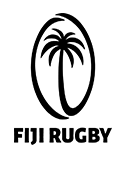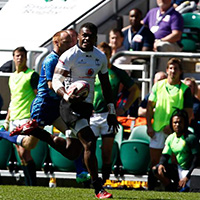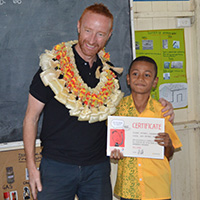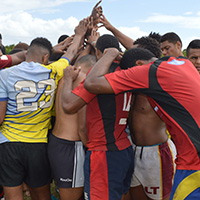Rugby House
7am kick-off, a tree on halfway?
Fiji played their first Test match on 18 August, 1924, against Western Samoa, winning 6-0. While the game kicked off at 7am with a small tree on the halfway line and Fiji played in an all-black uniform, some things evidently do not change – Fiji were praised for their speed and agility, Samoa were described as “the big, sturdy men of Apia.” 1924
Pioneers of Fiji Rugby
Rugby was believed first played in Fiji in the 1880s by European and Fijian soldiers of the Native Constabulary at Ba. By the early 1900s, reports of games began to appear in the Press and although most players were expatriates, a club competition began in 1904. 1913
The origins of the cibi
The meaning of Teivovo
Western Samoa 0 Fiji 6 – the first test match of 1924
The general opinion on all sides was that the game was the cleanest and finest exhibition of football played in Samoa.
Major dates in Fiji rugby history:
Fiji is one of the few countries where rugby is the principal sport. Only New Zealand, Wales, Samoa, Tonga and the Cook Islands can make a similar claim.
1884: Rugby was first played in Fiji by European and Fijian soldiers of the Native Constabulary at Ba, on Viti Levu Island.
1900: By this time reports of games began to appear in the press, and although most players were expatriates, a club competition began in 1904. Two of the earliest clubs were Civil Service and Constabulary.
1907: A.C. Holms, the Wairarapa fullback who passed through Suva with three other New Zealand players, not only played with Fijians on Albert Park, Suva, but predicted (in a Vancouver newspaper) that Fiji would one day make their mark in rugby football.
1911: The crews of visiting warships provided frequent opposition and the first regular club, Davies, had been formed.
1913: A group of New Zealanders came to build the Grand Pacific Hotel in Suva. One of them was plumber Paddy Sheehan from Dunedin — a former captain of Otago. Sheehan immediately saw the need for organisation of the then-casual Fijian rugby. He formed the Pacific Club and by the end of their first meeting three more clubs were planned and eventually formed: United Services, Cadets and Rewa. Together these clubs formed the Fiji RFU although played only in Suva. When the first officers of the Union were elected, Sheehan became chairman. Sir Ernest Bickham Sweet-Escott, the governor of the time, donated the Escott Shield for the club championship, which was won by the Pacific Club and nearly 90 years later is still competed for by Suva Union clubs.
1914: A so called ‘native competition’ began under the leadership of Ratu Epeli Ganilau and the first clubs were Taipou, Tarirere, Hill and Ofisa (Police) RFC.
1915: Local businessman J J Davies presented the Davies Cup, which was first won by Gaunavou (Tarirere). The same year a Fiji Native Union was begun and became affiliated to the Fiji RFU.
1924: Fiji’s first overseas match was in Apia, Samoa, in August 1924 while the team was on its way to Tonga. The match was played at 7am to allow Samoan opponents time to get to work afterwards and was played on a pitch with a large tree on the halfway line. Fiji played in all black and won 6-0.
1926: The first visit by an overseas side was that of Auckland University College. Tonga also visited Fiji that year and for the first time Fiji played in their present strip of white jersey, palm tree badge, and black shorts.
1928: A Fiji schools competition was started, but it was not until 1939 that the Fiji Schools Union was established. Up to this time, all rugby took place in the Suva-Nausori area. A union statement made it clear why: “It is very difficult to establish the game outside Suva because almost every suitable ground already has a concrete cricket pitch at the centre.”
1938: Fijians played in boots for the first time in honour of the first New Zealand Maori team to visit Fiji. There was still a tendency to take off boots during the match and throw them to touch-line. On the five-match tour, the Maori beat Fiji 2nd XV and Fiji Europeans before squaring the three-Test series.
1939: Fiji toured New Zealand for the first time. With many players still preferring to play barefoot, the Fijians played with a care-free spirit, romancing the crowds with their unpredictable running game. Incredibly, they also created history by becoming the first team to go through a full tour of New Zealand unbeaten, winning seven and drawing one, a record that stands to this day.
The last match of that tour saw the tourists outclass the Maoris 14-4 in Hamilton, and had the Waikato Times newspaper running out of superlatives for the Fijian style of rugby, calling it “the most brilliant exhibition of football seen in Hamilton for many years.”
“Almost uncanny in handling the ball, lightning in the pace of their sprinting, relentless in their dive tackling…and all the time pursuing methods of bright, open football, the Fijians gave a sparkling display and thrilled the large crowd.”
The paper went on to suggest that “Fiji is destined to play a big part in world rugby,” unaware of course that it would the abbreviated seven-a-side code that Fiji would eventually rule as their own.
1945: The Native Rugby Union had ceased to exist, and by 1953 Fiji and Suva had separate unions.
1951: Fiji’s second tour of New Zealand: Played 15, won 8, drew 2. lost 5.
1952: Fiji’s first tour of Australia helps the Australian Rugby Union recover from the brink of bankruptcy. The Test series is drawn 1-1 in front of record crowds.
1954: The second tour of Australia again sees record crowds. The Test series is drawn 1-1.
1957: Fiji tour New Zealand again and beat the Maoris in Dunedin and Wellington, then defeat a strong Auckland team 38-17.
1963: The Fiji Rugby Football Union is renamed Fiji Rugby Union, administering by 1971, 750 clubs and 10,000 players in 300 islands over 100,000 square miles of the Pacific.
1964: Fiji tour Europe for the first time, and lose narrowly to Wales 28-22 in a classic encounter that was talked about for years.
1970: A rampant Fijian side destroy the Barbarians 29-9 at Gosforth.
1973: FRU president, Ratu Sir Penaia Ganilau, warned: “There is room for a great deal of work in improving grounds and other facilities… administration is a constant problem in many unions and I would like to see more former players putting their backs into the task… the standard of refereeing has fallen since Independence and clearly the Union will need to pay special attention to this… coaching too is in need of this… only a determined drive to eliminate weakness and build on strengths can confirm Fiji as a world power in rugby.”
1974: A last-minute try sees New Zealand safely through 14-13 over Fiji in Suva.
1977: At the second Hong Kong Sevens, Fiji triumph in the final over Marlborough 28-18. Fiji beat the British Lions at Buckhurst Park More
1982: Fiji beat Vancouver XV to begin a 15-match winning streak through to 1984.
1984: Fiji destroy New Zealand 26-0 in the final of the Hong Kong Sevens.
1987: The first World Cup sees Fiji reach the quarter-finals but bow out to France.
1991: Fiji beat Zinzan Brooke’s New Zealand in the final of the Hong Kong Sevens after the most amazing try in the tournament’s history, underlining the incredible flair that Fijians have for the short code.
1991: The second World Cup is a disaster for Fiji as they lose all three pool games and come home early and embarrassed.
1992: Fiji beat New Zealand again in the final of the Hong Kong Sevens to make it three titles in a row.
1992: Fiji beat New Zealand again in the final of the Hong Kong Sevens to make it three titles in a row.
1995: Fiji fail to qualify for the World Cup.
1999: Abysmal refereeing from Kiwi Paddy O’Brien sees Fiji lose 28-19 to France in Toulouse in the World Cup.
2000: Fiji host an IRB 7s tournament in Suva but fell 31-5 to the Eric Rush led New Zealand side.
2001: Fiji are crowned Pacific Rim champions, defeating Samoa 28-17 in the final in Tokyo.
2003: ‘Bua Bullet’ Rupeni Caucau dazzled the crowds at the World Cup in Australia but Fiji were not able to make top eight after losing 22-20 to Scotland in the decider.
2005: Fiji, coached by Wayne Pivac, beat 7s powerhouses Argentina (22-14), Australia (31-5), England (24-19) before outplaying New Zealand to win 24-19 and claim the 2005 7s World Cup in Hong Kong. A star is born in William Ryder, who played for PWD Bure in Lautoka with the 7s WC being his international debut.
2006: The Digicel Fiji 7s team dethrone NZ as IRB World 7s Series title holders for the first time in six seasons with 144 points at the top of the IRB standings, 22 points clear of second placed England.
2006: Fiji women play their first-ever Test match. In the opening match of the inaugural Pacific Tri-Nations for women, the Fijiana went down 15-27 to Samoa. They turned the tables to crush Tonga 52-5.






